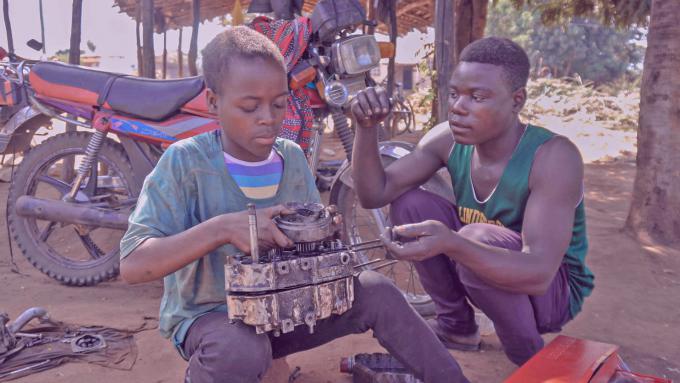Helping youths out poverty, one skill at a time

When she was impregnated aged at 16 years in 2019, Passover Ngwara was destined to become a statistic—a promising young girl who got pregnant, dropped out of primary school and fell into the vicious poverty trap. A typical rural Malawian story that replicates itself across this country.
But, despite all the odds, not all stories end in disaster. And Passover’s story is a rare ray of sunshine amongst the stories of gloom.
The cheerful and chatty 19-year-old attributes her changing fortunes and positive disposition to a Resilience Economic Development (RED) skills development component. The RED being implemented in Zomba district in eastern Malawi by Save the Children Malawi with funding from Save the Children Italy.
According to Damie Chinseu, Save the Children’s Agricultural and Marketing Coordinator for the RED project, the focus is on the youth between 15 to 24 years and women of child bearing age between 24 to 49 years.
“We actually want to give economic empowerment to these youths so that they can stand on their own. We trained the youth in welding and fabrication, carpentry and joinery, motor cycle mechanics, phone repair and hair dressing. Upon graduation, we give the youths start up tools for each category and, so far 122 youths have opened up their shops and they are operating within the impact area,” he says.
Of the six courses on offer, Passover chose to undergo a motorcycle mechanics course
“I graduated after four months and I received my certificate and a tool box that helped me open my own garage. This garage has helped in changing my life in many ways and now I am also changing the lives of fellow youths as I have now employed four youths on my garage,” she gleams.
Chinseu adds that the objective of the programme, that targets school-drop outs and women of child bearing age who are poor, is for the youth to be economically empowered.
Brenda Katowira, who now runs a welding shop at Mayaka in Zomba, says the skills she acquired transformed her life.
“Before the RED Project, I had dropped out of school in Form 1 in 2017 because my family could not afford to pay for my school fees and then I got married but we lived in extreme poverty” she explains.
When she completed her welding and fabrication training, like all graduates, Katewera received start-up equipment which enabled her to set-up a welding shop.
“Since I opened my welding and fabricating business, I have achieved a lot of things that I could not. For example, I am now financially dependent and I am now able to send some of my relatives to school and pay for their school fees, I can now buy fertilizer and iron sheets for my house. I would like thank the RED project for changing my life,” she says.
Similarly, 22-year-old Mercy Gelesoni was on the verge of destitution when the RED project came into her life.
“I am married with one child, and before the RED Project, we were facing a lot of challenges in our everyday life. I had to quit school in 2017 when I was in Form 1 and got married because of problems like school fees, food insecurity and other daily needs,” she says.
As a way out of poverty, Gelesoni opted for married.
“Marriage was my only option to reduce my poverty but it made it worse.”
When the RED project came and started recruiting poor youths in her area, she was one of the first to be recruited.
“Under the project, I learnt salon skills and we were provided with materials to start a business. I was so happy that I opened a saloon business and now I am financially dependent. With the little money I get from my business as I can provide food on the table and send my child to school. I want to ask the Red Project to continue their work and help other poor youth who need help.”
Agnes Chabwera is a saloon owner and tutor who has impacted her skills on the young trainees such as Gelesoni.
“Last year, I was given seven youths to train on different hair dressing styles and after that, they received certificates and opened their own saloons. I want to appreciate what RED Project is doing in our village because the youths who completed the first phase have really benefited a lot from this project as they are now able to take care of their family needs with the little they get from their businesses,” she says.
 Malawi
Malawi